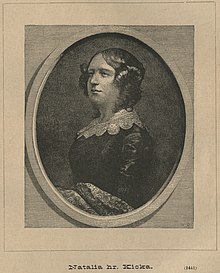You can help expand this article with text translated from the corresponding article in Polish. (February 2020) Click for important translation instructions.
|
| Natalia Kicka | |
|---|---|
 | |
| Born | (1806-08-06)August 6, 1806 Vilnius, Russian Empire |
| Died | April 4, 1888(1888-04-04) (aged 86–87) Warsaw, Russian Empire |
| Nationality | Polish |
Natalia Anna Kicka (6 August 1806–4 April 1888) was a Polish archaeologist, numismatist and social activist.
Biography
Natalia Anna Kicka was born as the eldest of four daughters to Piotr Bisping, marshal of Wołkowysk and Józefa Kicka and grew up on a family estate in Hołowczyce.
Kicka collected coins and medals and worked with several pioneers of the numismatic movement in Poland, especially Karol Beyer, Emeryk Huten-Czapski and Kazimierz Strończyński. In the 1870s she conducted archaeological excavations in Kujawy on the so-called Kuyavian Pyramids.
She married Ludwik Kicki, in January 1831. He died in the same year at the Battle of Ostrołęka (1831). Her memoirs are a valuable historical source for the November Uprising. Kicka is buried at the Powązki Cemetery in Warsaw.
Memoirs
- Pamiętniki; wstęp i przypisy Józef Dutkiewicz; tekst opracowal, przypisy uzupełnił oraz indeksy sporządził Tadeusz Szafrański. Warsaw: Instytut Wydawniczy “Pax”, 1972
References
- ^ Adrianna Szczerba (2017). "PIONIERKI POLSKIEJ ARCHEOLOGII". Kwartalnik Historii Nauki I Techniki. 62 (4): 139–150.
- Krzysztof Filipow (2013). "Natalia Kicka (1801–1888) – patriotka i kolekcjonerka "pamiątek narodowych"". Збирник наукових статей” (in Polish). 33: 159–167.
- Natalia Kicka (1876). "Żale Żurawieckie". Wiadomości Archeologiczne (in Polish). 3.
- "Pomniki - szczegóły" (in Polish). Warszawskie Zabytkowe Pomniki Nagrobne. Retrieved 14 February 2020.